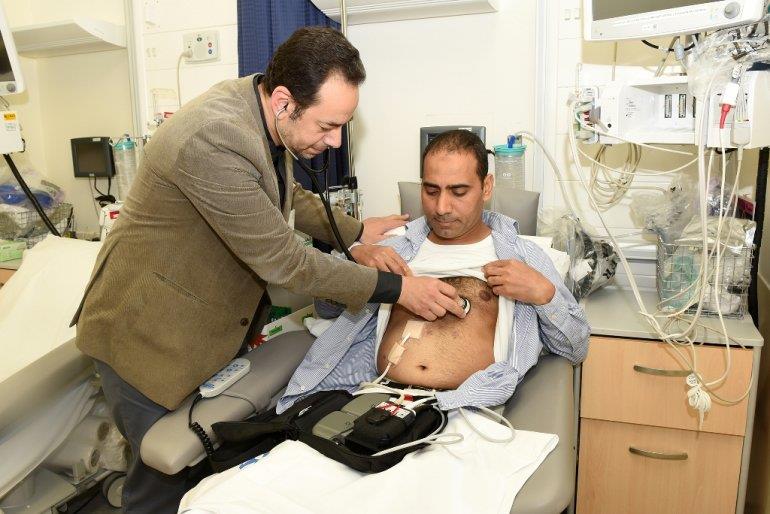
New technology transforms lives of heart failure patients in Qatar
Doha: Patients at Hamad Medical Corporation (HMC) Heart Hospital are benefiting from a new technology that is being used to treat the most advanced forms of heart failure. The new technology, known as a ventricular assistor, or 'HeartMate', is an electrically powered heart pump that improves blood flow and, in turn, the long-term health outcome for patients with heart disease.
According to the surgical team at Heart Hospital's Cardiac Surgery Department, the new technology will both save lives and significantly improve the quality of life for patients with end-stage heart failure.
"The ventricular assist device is a small mechanical pump that is implanted in the chest and supports heart function and blood flow in individuals with weakened hearts. The device helps the left ventricle, or the main pumping chamber of the heart, to pump blood through the aorta to the rest of the body. Essentially, it helps circulate blood throughout the body in patients whose hearts are too weak to pump blood adequately", said Dr Abdulaziz Al Khulaifi, Senior Consultant and Chairman of Cardiothoracic Surgery at Heart Hospital.
Open-heart surgery is performed to place the pump above the patient's left ventricle. The pump attaches to the aorta and to the left side of the heart. Once it is in place, a tube is passed through the skin of the abdomen which connects to a power cable. The power cable is connected to a small monitor called the controller and then to a power supply.
Dr Al Khulaifi added that patients who receive the device have fewer clotting and bleeding episodes than those with other ventricular assist devices. He said the HeartMate's small size and quiet operation make it suitable for a wide range of patients.
Two patients with advanced heart failure who were not responding to other treatments were the first to receive the devices in Qatar. The new technology is credited with saving the lives of these patients, a male in his late thirties and a male in his sixties. One of the two patients has been discharged from hospital and is continuing to recover at home; the other will complete his recovery in hospital where he has access to a designated care companion.
Dr Rola Taha, Anesthesiology and Intensive Care Consultant at Heart Hospital's Cardiothoracic Surgery Department, said prior to the surgery both patients received comprehensive education about the device. She said the surgical team explained what they could expect prior to, during, and after their surgery as well as the required maintenance for the device.
The patients underwent five months of consultations, which included an extensive medical evaluation and training on how to use the device, including how to handle emergency situations. She said after surgery and recuperation, most patients are able to resume a normal life but will need to make some minor accommodations, including dietary and medication modifications.
Patients with the device, for example, cannot swim, play contact sports, and should drink at least two liters of fluid each day to promote good blood circulation. The system controller and rechargeable batteries, which provide approximately four to eight hours of mobile patient support, are worn around a belt or in a shoulder bag.
"The pump is best used in patients under the age of 70 who have normal organ functions, particularly liver and pulmonary functions. It is also ideal if a patient does not have any malignant tumors", added Dr. Taha.
After surgery patients spend a few days in hospital to ensure the device and equipment settings are appropriate for their needs.
Dr Al Khulaifi said the medical team at Heart Hospital works with each patient and their caregivers to ensure they fully understand how the device works. After being discharged, patients will be required to have regular checkups with their physician and the medical team at Heart Hospital. Most patients are able to return to their normal daily life, with a few limitations.
Dr. Al Khulaifi said the device provides a new option for physicians managing advanced heart failure patients and is used as both a bridge to transplantation and as a long-term or destination therapy for patients with end-stage heart failure. He explained the device is superior to older-generation devices because it is more durable and provides improved blood flow for patients who can no longer rely on earlier stage treatment options. He said patients who receive the device experience significant improvements in their quality of life, adding that the device can support a patient for many years without them experiencing any of the symptoms of heart failure.

Legal Disclaimer:
MENAFN provides the
information “as is” without warranty of any kind. We do not accept
any responsibility or liability for the accuracy, content, images,
videos, licenses, completeness, legality, or reliability of the information
contained in this article. If you have any complaints or copyright
issues related to this article, kindly contact the provider above.

















Comments
No comment